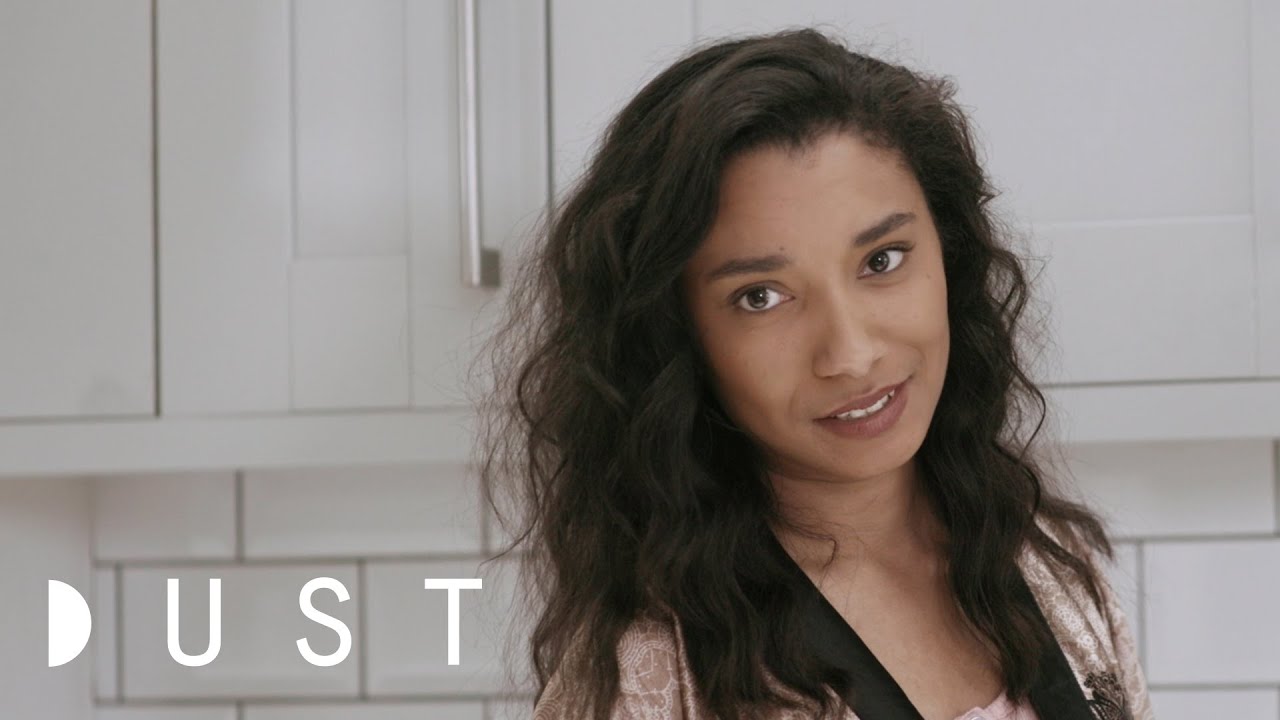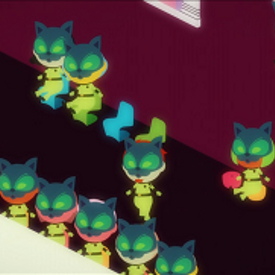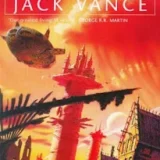An unofficial and unauthorized overview of The X-Files
(Parts 1 2 3 4)
Part Three: Ties That Bind
1. Family Ties, Family Secrets
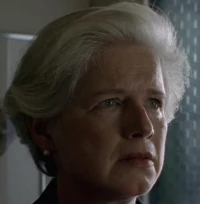
MRS. MULDER: I have nothing to say to you.
CANCER MAN: Really? We used to have so much to say to each other. So many good times at the Mulder’s summer place [smiling]. Your kids… young and energetic. I remember water-skiing down there with Bill. He was a good water-skier, your husband; not as good as I was — but then, that could be said about so many things… [Mrs. Mulder looks angry] couldn’t it?
— dialogue from “Talitha Cumi”
Cancer Man’s reminder that he once had an affair with Teena Mulder, and the off-handed but cruel manner in which he refers to it, is one of the finest pieces of writing on The X-Files. But it reminds us that the story line wasn’t just about aliens, conspiracies and monsters of the week, but about human beings in their ordinary relationships – even if those relationships are touched by extraordinary circumstances.
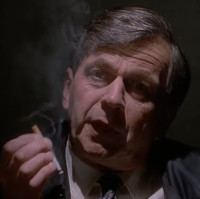
Fox Mulder’s family has been torn apart by the abduction of Samantha, but it takes years to tell the full story behind that abduction. Mulder’s recovered memories of the event don’t seem to be consistent; in a flashback in “Little Green Men,” the abduction comes as a complete surprise, with an alien light show interrupting their game of Stratego as they argue about whether to watch “The Magician” or a movie on TV:
They look towards the window, where weird red and blue lights flash through. Fox moves up to the window and looks through. The chandelier is shaking, and Fox looks at that. A weird glow starts emanating through the door. The doorknob slowly turns. The door opens and a bright light shines through. Fox’s eyes open widely as he makes out a strange-looking silhouette that doesn’t quite look human. Samantha screams and he turns. Samantha is suspended in the air.
If that were the entire truth, it would be traumatic enough, but no blame would attach to Mulder’s family. It would all fall on the inhuman invaders, or perhaps Cancer Man. But little by little, hints of the darker truth emerge.
In “Paper Clip,” Mulder and Scully find an archive of millions of medical files and tissue samples – one of them for Samantha. Only the sticker on her file folder is loose, and under it is one for Fox himself. He already knows that the Syndicate has been involved in abductions, and (from an old photo) that his father was involved with the Conspiracy. But was Samantha only a second choice from his family? Mulder drives all the way to Connecticut to confront his mother:
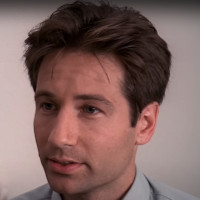
MULDER: Mom, did he ever ask you to make a choice?
MRS. MULDER: Don’t do this…
(She starts to get up but he puts his hands on her cheeks.)
MULDER: Mom, listen to me! I need to know! Did he make you make a choice?
(She starts to cry.)
MRS. MULDER: No. I couldn’t choose. It was your father’s choice and I hated him for it. Even in his grave, I hate him still.
In “Demons,” Mulder had a traumatic flashback of the very night the decision came down – and not from Bill Mulder himself, but from Cancer Man – who somehow realizes that young Fox is looking and listening – having been awakened by Samantha, stricken with fear at what she has already heard.
MRS. MULDER: How can you do this to our family?!
MR. MULDER: I’m not doing it! It’s not just me. These orders are coming down from…
CANCER MAN (to Fox): You’re a little spy.
This may be a false memory, implanted by a psychiatrist working for the Syndicate. Yet chances are that Cancer Man himself was the one who made the decision, or talked the Elders into it, because – as we later learn – he believed that he was Fox Mulder’s biological father. Bill Mulder may never have suspected that himself, and Fox himself might never have heard it – the seeming revelation came while he was unconscious on the operating table in “Amor Fati:”
CANCER MAN: A father has high hopes for his son but he never dreams his boy’s going to change the world. I’m so proud of this man — the depth of his capacity for suffering.
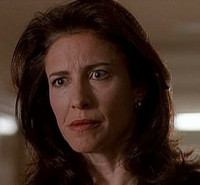
DIANA FOWLEY: Like father, like son.
The seeming failure of that operation called Cancer Man’s belief into question, and there was speculation that Samantha was fathered by Cancer Man – who trots out a false Samantha as well as a cancer cure for Scully in “Redux II,” to tempt Mulder into leaving the FBI and joining forces with him. That false Samantha claims she has never known a father besides Cancer Man, and has no memories of the Mulder family. But Mulder isn’t buying:
MULDER: What have … what have you given me? A claim of a cure for Scully, is she cured? You show me my sister only to take her right back. You’ve given me nothing!
CANCER MAN: I intend to keep my promises, I just need something from you.
MULDER: You murdered my father, you killed Scully’s sister, and if Scully dies, I will kill you. I don’t care whose father you are, I will put you down.
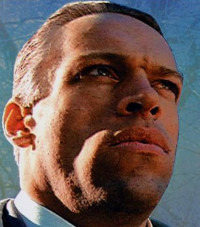
Cancer Man didn’t claim credit for having persuaded the Alien Bounty Hunter to heal his mother in “Herrenvolk,” but that too may have been a ploy – Teena Mulder was to commit suicide a couple of years later after suffering another terminal illness. If Fox Mulder ever truly had a family, he has none at the end. Meanwhile, Scully’s involvement with him has been costly to her own family, and alienated her brother William Scully Jr., as revealed in a scene from ‘Redux II:”
BILL: You’re a real piece of work, you know that, Mr. Mulder?
MULDER: Why is that, because I don’t think the way you think? Because I won’t just sit passively back and watch the family tragedy unfold?
BILL: You’re the reason for it. And I’ve already lost one sister to this quest you’re on, now I’m losing another. (Bill has to fight back tears) Has it been worth it? To you, I mean, have you found what you’ve been looking for?
MULDER: No…
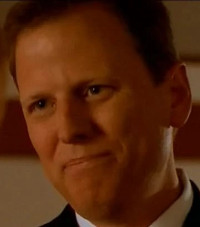
In “Gethsemane,” Mulder’s pursuit of seeming proof of extraterrestrials – a body found in the Canadian Rockies — has dragged Scully away from a family gathering. It is not the first time she has been torn between loyalty to her family and loyalty to Mulder. As if that weren’t enough, her mother Margaret has let Bill know about her terminal cancer. And one of the family guests is Father McCue, a priest who hopes to bring Scully, a lapsed Catholic, back to the Church.
Yet there is still a profound difference between Mulder and Scully – one that stands in the way of their relationship becoming more than professional. She has a family, a family she loves. Mulder never seems to visit his mother except to interrogate her about the details of the conspiracy, and that may in part be why she commits suicide in “Sein und Zeit;” Scully’s get-togethers with her parents and siblings are family occasions, occasions of love and loyalty as they should be – even when there are stressful situations.
We first meet Scully’s parents in “Beyond the Sea,” as they wind up a Christmas visit to Scully with the kind of small talk but intimate small talk that only truly loving families know:
WILLIAM SCULLY: Are you going to leave this up all year?
SCULLY: Yup. All year. Since you always made us take the Christmas tree down the day after Christmas, I’m making up for lost time.
(She starts piling plates on the kitchen table.)
WILLIAM SCULLY: If your idea of a good time is picking up dried pine needles, treat yourself.
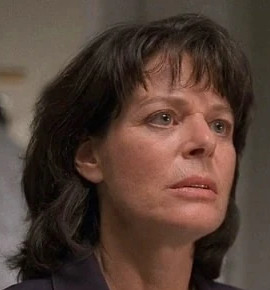
MARGARET SCULLY: As if he’s an authority on having a good time.
We never get a glimpse of Mulder’s childhood except as it relates to the abduction of Samantha. It’s as if she’s the only one in the family he really cares about. One wonders whether he would care as much if she were still present.
In “One Breath,” by contrast, we get a touching scene from Scully’s childhood that has nothing to do with aliens or conspiracies; it’s just about her, about what happened when her brothers gave her a B.B. gun as a birthday present and took her out hunting. No big game to be found, of course; just a garter snake.
MARGARET SCULLY: And they began shooting. Wanting to fit in with her brothers, Dana also shot at the snake.
(The bullets pierce the ground near the snake as it tries to get away.)
It squirmed wildly, desperately fighting for life but as the boys continued to shoot the snake began to bleed. When she realized what she had done…
(Dana lowers her gun and walks over to the dead snake. She kneels down, picks it up and begins to cry.)
Dana began to cry with irrevocable guilt. Through her tears, she was saying that… something was missing from the snake. She had taken something that was not hers to take. And although deathly afraid of snakes, Dana held the animal as if sheer human will could keep it alive. The snake, its blood on her hands, died. There was nothing she could do to bring it back.
In “Beyond the Sea,” we had already learned that William and Dana Scully had nicknames for each other: Ahab and Starbuck. Was there ever anything like that in the Mulder family? William dies in that episode of course, and when he speaks from beyond the grave in “One Breath,” he has only one regret:
I never knew how much I loved my daughter until I could never tell her. At that moment, I would have traded every medal, every commendation, every promotion for… one more second with you.
At his funeral, there was another touching revelation as his ashes are flung into the sea he loved while his favorite song, “Beyond the Sea,” plays on a loudspeaker.
SCULLY: As a captain, he was entitled to burial at Arlington with full ceremony.
MARGARET SCULLY: This is exactly how he wanted it. Just the family.
(There is an uncomfortable pause. The man dumping out the ashes holds up the empty urn and takes off his hat.)
This song was playing when his ship returned from the Cuban Blockade. He marched right off up to me… and he proposed.
Scully’s family memories are sacred to her; that is why it so painful to her when the serial killer Luther Lee Boggs in the same episode claims to have intimate knowledge of them — even to know what William’s last words were when she saw his phantom seated on a chair in her apartment, speaking inaudibly.
She feels violated, and yet she wants to believe – when Mulder himself, the believer in all extreme possibilities, does not. She has doubts that her father approved of her own choices in life, doubts that he was proud of her. Yet even after some of Boggs’ visions about a copycat killer prove true, she cannot bring herself to honor a monster like him with her belief. It would be a betrayal of her Catholic upbringing, of her family, of all she holds dear. She doesn’t need Boggs to reveal William Scully’s last thoughts and words: “He was my father.”

William and Charles Scully, Dana’s brothers, appear rarely in the series. Because both serve in the Navy, however, we can understand that. And we learn bits and pieces of information about them. Charles makes model airplanes as a hobby; William and his wife Tara have a son Matthew, who was born during the series although he never had a chance to make an appearance. This, too, we aren’t simply told, but learn first-hand as Dana and Margaret arrives at William Scully Jr.’s home at the U.S. Naval Station in San Diego for a family gathering:
SCULLY: Hello? Merry Christmas!
TARA: Hello! (She smiles and goes to greet Scully and Mrs. Scully at the door.)
MARGARET: Oh, my God. Look at you. (She hugs Tara)
TARA: Can you believe it?
MARGARET: How am I going to get my arms around you?
Again, there is a touching intimacy among the Scullys that we never see among the Mulders:
SCULLY: This is the exact same layout as our old house.
BILL: That’s the Navy for ya.
TARA: Yeah. Bill tells me, Mom, that you’ll be staying in your old room. And the nursery is going to be in Dana and Melissa’s room.
BILL: That’s right. (He struggles with the suitcases up the stairs.)
TARA: I got it. Bill! (She takes a suitcase from him)
BILL: Thanks. (He goes upstairs. Tara behind him.
Margaret looks at the tree. Scully joins her.)
SCULLY: Mom? You okay?
MARGARET: Oh, yeah. I was just thinking about your Dad… and Melissa… and how much I miss them.
This being The X-Files, we can’t expect the domesticity of the opening scene of “Christmas Carol” to remain untroubled for long, and the reference to Melissa is a sign of that. But it is the very domesticity of the Scully family and its shared values that provide the context for the story of Emily – the alien hybrid child created from her own ovum.
It is only after Tara expresses her joy about becoming a mother that Dana Scully confides to her own mother that she herself can’t have any children because of what was done to her during her abduction. But she doesn’t mention – yet – the strange phone call in Melissa’s voice that has set her on the path towards finding that hybrid child she thinks may be Melissa’s – she looks just like Melissa as a three-year old girl – but turns out in fact to be her own.
Along the way, we share other family memories – a rabbit she and her brother Bill caught as a child, and that she hid when he wanted to make it into a stew, only to let it die in her hiding place; Margaret giving her the gold cross she still wears when she was in her teens; a photo album from 1966, when the family was living in Japan; that Melissa was traveling up and down the West Coast in 1994, out of touch with her family most of the time.
Scully theorizes Melissa may have been concealing a pregnancy on that West Coast trip, which turns out not to be the truth – but it could be where she picked up her New Age beliefs. But when her investigation, of which she has told her family nothing, reveals that Emily’s adoptive mother was murdered, it is her brother’s reaction that hurts the most when she brings the child home.
BILL: She called you from beyond the grave to tell you that? Sounds like something your partner would say.
SCULLY: It does not matter where that phone call came from. What matters is that there is a little girl who needs my help.
BILL: This isn’t about any little girl, Dana. This is about you. It’s about some… void, some emptiness inside you that you’re trying to fill.
Yet Bill isn’t trying to torment her, only to counsel her as a brother should. It is the same when he produces a photo from 1994 that proves Melissa was not pregnant, and she reacts that Emily could still be her child through in vitro fertilization. He still thinks she’s only trying to compensate when word comes that the child is not Melissa’s, but Scully’s own.
Bill Scully Jr. may be practicing toughlove, but in “Emily” it turns out that Mulder hasn’t been honest with Scully. Only now, flying out to San Diego to help her adopt the child, does he reveal to her that all her ova had been extracted during her abduction. That has to hurt. “Why didn’t you tell me, Mulder?” she asks. “I never expected this. I thought I was protecting you,” he responds.
Spoken just like a man who doesn’t know what it means to be part of an intimate relationship based on trust. Once Mulder is in the scene, moreover, it’s no longer about Emily – it’s about the conspiracy behind her, about Transgen Pharmaceuticals and the shapeshifting green-blooded clones who run it. Even the Lone Gunmen get involved, and Scully’s kin are reduced to cameos, with Mulder giving Scully only cold comfort when Emily is gone.
Bill Scully and his family are never seen again, but Margaret returns sporadically during her daughter’s miracle pregnancy and motherhood. She is supportive to the end, but in the end she knows that she is no longer the only family Dana has. Fox Mulder, who has known only male bonding for most of his career, has finally found a closer kind of bond.
2. It’s the Relationship, Stupid
Chance meeting your perfect other, your perfect opposite – your protector and endangerer. Chance embarking with this other on the greatest of journeys –- a search for truths fugitive and imponderable.
– Dana Scully, opening voiceover, “Trust No 1”
Mulder and Scully are one of the greatest screen couples ever, and their relationship is at the center of the series and the movie spin-offs – including, as Chris Carter promised at the outset, I Want to Believe as well as Fight the Future.
It’s ancient history now, but fans of The X-Files were once passionately divided over just what kind of a relationship it was or should be. The Shippers, as they called themselves, could hardly wait for romance to blossom, whereas the Noromos wanted Mulder and Scully to be as chaste as… well, Joe Friday and Bill Gannon.
The Noromos had their way through most of the series, despite occasional hints that Scully was developing feelings for Mulder – as witness her jealousy over a sexy biologist her partner meets in “War of the Coprophages”– “Bambi? Her name is Bambi?”
Chris Carter may well have had practical reasons for that. Other TV series built on sexual tension had foundered as soon as that tension was released, Moonlighting having been the most prominent example. Only after it became absolutely necessary to the story line, with Scully’s pregnancy in “Requiem,” did the truth come out – and in an oddly offhanded way.
“I know you spend too much time alone,” the Shadow Man tells her in “Trust No 1.” But then he adds, “And I know … that on one lonely night you invited Mulder to your bed.”
That’s it. That’s the Big Reveal, as they’d call it on a daytime soap. And yet fans knew right off what night the Shadow Man was talking about. It was in “all things,” an episode written and directed by Gillian Anderson, in which a series of chance events, including an encounter with a former boyfriend, brings her back to Mulder. The last we see of them, they are sitting on her couch together, concluding a philosophical conversation about destiny:
SCULLY: What if there was only one choice and all the other ones were wrong? And there were signs along the way to pay attention to.
MULDER: Mmm. And all the… choices would then lead to this very moment. One wrong turn, and… we wouldn’t be sitting here together. Well, that says a lot. That says a lot, a lot, a lot. That’s probably more than we should be getting into at this late hour.
In the opening teaser, Scully is getting dressed the next morning, and the camera pans to show Mulder in her bed, apparently naked. We never see them make love, but surely there would have been no ado about their choices leading to “this very moment” if their relationship hadn’t reached a turning point, if there was nothing more significant to it than Mulder’s return from a wild goose chase for crop circles in England.
In subsequent episodes, we see what are clearly romantic scenes, as when Mulder gives Scully a baseball lesson in the epilogue to “The Unnatural.” It was the first episode to be written and directed by David Duchovny, and he insisted on ending it with that epilogue rather than the death of alien-turned human ball player Josh Exley, because – as he explained to BBC reporter Peter Morris in 2000 — he wanted to make a point about Mulder and Scully and their relationship:
It was really important to me that Mulder and Scully have communication on this issue, but that it not be literal and that the audience realize Mulder has called Scully up to the ballfield because he’s learned something about life. I wanted him to impart it to Scully without telling her what it is. At first he’s going to tell her, but the last line belongs to Scully, who says, “Shut up, I’m playing baseball.”
“Je Souhaite,” the last episode before Mulder’s abduction, finds them together again at the close – not having sex, but comfortable together as only lovers can be while drinking beer and watching Caddyshack. “It’s a classic American movie,” he insists, but Scully thinks it’s just a guy movie. “Okay, when you invite me over to your place we can watch Steel Magnolias.”
“Trust No 1,” in which Scully tries to arrange a reunion against her better judgment, was one of the most achingly romantic things ever to appear on TV – despite the fact that Mulder appeared only in flashbacks and in a brief distance shot played by a stand-in. And finally, there was that tender fadeout kiss over their newborn son in “Existence” – before Mulder was forced to go on the run.
There had been brief kisses in “Millennium” and “Amor Fati.” There was the way Scully looked at Mulder, and Mulder at her, in “Requiem” – and the look of devastation on her face in “Within” after she had lost him. “Scully’s Theme,” a sad and seemingly wordless dirge composed for the latter, perfectly expressed her feelings (The words, deliberately left inaudible at Chris Carter’s insistence, were “We are near.”).
This was the real thing, and the subtlety of its portrayal was actually a plus. Sex on the screen tends to fall into two categories: hard-core porn and the kind of R-rated films in which name stars roll around a lot, with sheets strategically placed. Neither can capture the passion or tenderness of true love, which may explain why so many R or NC-17 movies are about jealousy and betrayal, as in Fatal Attraction. Carter was right to leave the intimate details to the imagination.
But it was a long journey, a very long journey to reach that point. In the pilot episode, Scully strips to her undies as she gets ready to shower – only to notice strange bumps on her back, which she shows to Mulder – he assures her they are only mosquito bites, not alien marks like those on returned alien abductees.
Carter may have meant it as a tease for network executives rather than as a hint of a sexual relationship to come: he had a series to sell, after all, and perhaps he hoped sexual innuendo would sell it. Indeed, he later argued in The Truth Is Out There, a guide to the first two seasons, that he had deliberately kept sex out of The X-Files from the start:
A big part of my job during the … pilot … was protecting against that. I was really the lone voice saying we cannot have these people romantically involved. There cannot be real TV sexual tension here or else the show won’t work. As soon as you have them looking googly-eyed at each other, they’re not going to want to go out and chase these aliens. The relationship will supplant or subvert what’s going to make the show great, which is the pursuit of these cases.
Once The X-Files was green-lighted, in any case, we saw no more of that sort of thing. The relationship, which began with an attempt by the higher ups to use Scully as a tool to discredit Mulder, grew into one of mutual respect and loyalty: a friendship, but a guarded one. Although she may never have put it into words, or even conscious thought, Scully seemed to sense that Mulder was carrying too much emotional baggage for her to relate to him romantically.
Moreover, she had some reason for living besides her job, and certainly besides his job. She was only a reluctant workaholic, and although we never saw it, she apparently had some sort of a love interest. “Unlike you, Mulder, I would like to have a life,” she tells him in “Jersey Devil,” refusing to cancel a date to go out on a case. Scully also had strong ties to her family: even if her relationship with her father was flawed (“Beyond the Sea”), it was still a relationship.
In an interview for a featurette called Inside the X-Files, David Duchovny put his finger on the essence of the relationship at that time:
It’s like the one friend, I guess, that he has in this world. I mean, I heard a phrase once, somebody was talking about their wife. This was a person who was very inept socially, not the wife, but the man. There were many things said about him that weren’t kind, and he said, “My wife, who is lovely and social and everything like that, is my human credential.” It like makes him a human being because people think, “If, well, if she can stand him, he must have some humanity within him.” And I –sometimes I think about Scully as Mulder’s human credential. It’s the only thing that makes him not crazy in many ways.
What do we know about Fox Mulder at the outset? Only his obsession. We are told nothing of his family beyond the abduction of Samantha, we don’t have a clue about his life outside the FBI. We soon come to suspect that he doesn’t have an outside life.
His only friends seem to be the Lone Gunmen conspiracy geeks, but perhaps only because they are useful to him. Nothing is said about his parents in the first season, suggesting that he isn’t emotionally close to them, and we later learn that they were divorced after Samantha’s abduction. Young Fox must have spent his teens it an atmosphere of animosity between his parents that he could never comprehend.
At the time he met Scully, he didn’t seem to have any sexual outlet besides his subscriptions to Adult Video News and Celebrity Skin. As late as the fifth season episode “All Souls,” we catch him at a XXX movie theater. More than two years earlier, Clyde Bruckman (“Clyde Bruckman’s Final Repose”) had chided Mulder: “You know… I’m sure there are worse ways to go, but I can’t think of a more undignified one than auto-erotic asphyxiation.”
In “Fire,” we learn he once had a torrid affair with Phoebe Green, a fellow student at Oxford University who later became a Scotland Yard investigator. But that was before his recovered memories of Samantha and the obsession with the X-Files apparently put a damper on his love life. He might have rebuffed Green’s renewed overtures even if he hadn’t learned she was already involved with another man.
At the end of the fifth season, Diana Fowley is referred to by the Lone Gunmen as having been Mulder’s “chickadee” at the time he graduated from the FBI Academy, and even having been involved with him when he discovered the X-Files.
This is revisionist backstory, since Fowley had never been mentioned before. It’s implausible, in any case, that Mulder would warm up to her so much later, letting her come between him and Scully, when she’s disappeared for seven years and never given any account of herself. Should it surprise him in “One Son” that she turns out to be on the dark side?
Gillian Anderson offers a far more believable romantic past for Scully in her script for “all things.” Chance leads her to an encounter with Dr. Daniel Waterston, her former lover – and a married man at the time. Not wanting to become a home-wrecker, she gave up her budding career as a doctor and moved to Washington to join the FBI. Scully fearful of causing the break up of his family left to join the FBI. It turns out Waterston’s marriage later broke up anyway, and he still has hopes that he and Scully can get back together. But she turns him down, telling him it would be better for him to mend his relationship with his daughter, who was hurt by their affair.
Before the advent/return of Fowley, Mulder’s only on-screen close encounters of the sexual kind – in “3” and “Syzygy” – were freakishly fortuitous. Strangely, or perhaps not so strangely, it was the same with Scully. That she would have a one-night stand with a perfect stranger in “Never Again” suggests that not only was she pissed off at Mulder – the immediate motivation – but that she had not had a real relationship with anyone else for some time.
For both of them, it seems to be more that the garden variety fear of commitment. Mulder may believe that he could only endanger any woman he truly loved – a theme echoed years later by Scully (“your protector and endangerer”). Yet they were mutual protectors from the start; she saved his again and again, just as he saved hers. But through the years that they were close friends and comrades in arms but never lovers, she saved something more important: his soul.
In “Amor Fati,” Mulder nearly dies again after an operation by which Cancer Man hopes to transfer his immunity to the Black Oil. Comatose, he has a dream in which he abandons his quest and lives to a ripe old age. Cancer Man appears as a father figure, tempting him with soothing words, even as Apocalypse unfolds. But Scully too appears in the dream, and she is somehow the real Scully: “Get up, Mulder,” she exhorts him. “Get up and fight the fight.”
In a touching scene at the end of the episode, after Scully has once again rescued him, Mulder can remember the dream – and its true meaning:
MULDER: Scully, I was like you once — I didn’t know who to trust. Then I… I chose another path… another life, another fate, where I found my sister. The end of my world was unrecognizable and upside down. There was one thing that remained the same.
(He holds her face and gazes at her.)
MULDER: You… were my friend, and you told me the truth. Even when the world was falling apart, you were my constant… my touchstone.
SCULLY: And you are mine.
And so we find them again in I Want to Believe, where Carter teases us about their relationship when Scully travels to his remote country home to convey the FBI’s appeal to him for help in the case of a missing agent. Only gradually do we realize that they have been living together there for some time — as tensions over whether to credit the alleged visions of the self-proclaimed psychic and convicted child molester Father Joseph Crissman threaten their relationship.
Yet whatever their differences, they love each other. They need each other, and not just when Scully yet again saves Mulder’s life – this time from a gang of mad doctors. A doctor again herself by this time, she faces a moral crisis that has nothing to do with the FBI case, and yet it is through Mulder – and a cryptic piece of advice from Crissman, whom she would never have met otherwise – that she finds the courage to continue her experimental treatment for a dying boy when all others have given up hope.
Help and hope stand them in good stead together, when they most need it.
Tune in tomorrow for Part 4.
Pierce is the son of John Robinson Pierce, the engineer, scientist (and science fiction writer) who coined the word “transistor”. He is married to Marcia (née Feinbaum), widow of Arata Suzuki, and lives in Ramsey, New Jersey. He works as an editor for two trade magazines, Private Label and Quick Frozen Foods International.
Pierce published the science fiction fanzine Renaissance from 1968 through 1974, and was an outspoken critic of the New Wave. In the 1970s he edited The Best of Murray Leinster, The Best of Cordwainer Smith and The Best of Raymond Z. Gallun for Del Rey Books. In 1977–78, he was named editor of Galaxy at a time when the magazine was in financial trouble, an experience he later recounted in Thirteen Months of Torment.
After leaving Galaxy, Pierce focused on a four-volume (1987–1994) critical history of science fiction under the general title, “A Study in Imagination and Evolution”, adopting a conceptual framework, as opposed to a strictly chronological approach, and using parallels with biological evolution and dialectics to characterize the evolution of the genre as a whole. As of 2012, he was working on a revised and updated version.
He has written critical essays and book introductions on Cordwainer Smith, and essays on Twin Peaks and The X-Files for the fanzines Wrapped in Plastic and Spectrum and has had other articles published in The New York Review of Science Fiction and Science Fiction Studies. Besides works related to science fiction and popular culture, he is the author of a family history, The Children of Levi Peacock (2002).



